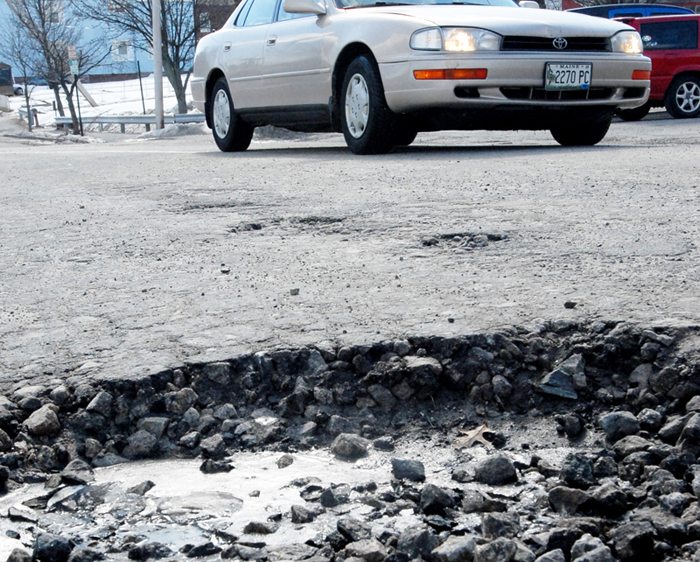WASHINGTON — A report issued Thursday by an industry-funded transportation research group estimated that Maine drivers pay, on average, nearly $300 a year for additional vehicle repairs because of poor road conditions in the state.
The report by the transportation organization known as TRIP says 33 percent of Maine’s local- and state-maintained roads are in poor or mediocre condition. The percentages in the Portland and Bangor regions are even higher: 61 percent and 40 percent, respectively.
The group estimated that Maine’s road conditions cost the state’s drivers an extra $301 million a year in vehicle maintenance and are responsible for as many as one-third of serious crashes.
Statewide, drivers pay an average of $299 more for maintenance because of road conditions; Portland-area drivers pay an estimated $516 more.
The organization says a “substantial boost” is needed in federal, state and local funding for transportation, but the report stops short of recommending ways to increase funding. Typical options include state borrowing through bonds and — more controversially — increasing the gasoline tax.
TRIP bills itself as a nonprofit transportation research organization. It is funded by transportation-sector industries, including construction and engineering companies, insurance companies, labor unions and equipment suppliers, distributors and manufacturers.
The group has released similar state-specific reports in recent weeks calling for increased investment in transportation infrastructure.
“The TRIP report offers a stark view of just how badly the lack of transportation funding is hurting Mainers and Maine businesses,” Doug Hermann, president of the industry association Maine Better Transportation, said in a prepared statement.
Bruce Van Note, Maine’s deputy transportation commissioner, did not take issue with the findings but said the Department of Transportation would differentiate between state and local roads.
The department is responsible for about 8,500 of Maine’s 22,000 miles of public roads. It focuses on “priority one” roads — such as the interstates and routes numbered in the single digits — which carry more than 80 percent of the traffic.
Those high-priority state roads, in general, tend to be in better condition than many locally maintained roads, Van Note said. But he acknowledged that transportation funding is a perennial issue.
“Capital challenges are common throughout the country and Maine is no exception,” Van Note said.
Washington Bureau Chief Kevin Miller can be contacted at 317-6256 or at:
kmiller@pressherald.com
Send questions/comments to the editors.



